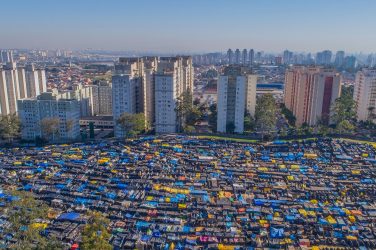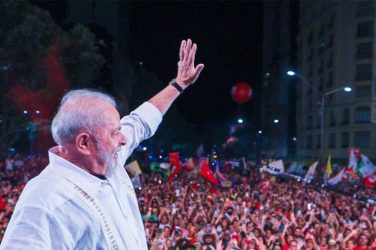A year after witnessing the murder of his friend by a gang of farmers in Brazil’s agricultural heartland, indigenous activist Elson Gomes still fears for his life. Plus he misses his friend.
“He was a strong guy,” said Gomes, 30. “I miss him, and his commitment to our cause, every day.”
Last June, Gomes and hundreds of other Guarani-Kaiowa people gathered for a protest demanding formal ownership over 55,600 hectares of land in Mato Grosso do Sul state in southwestern Brazil.
The flat, dry, expanse of savannah – ideal for growing soy or grazing cattle – sits near Brazil’s border with Paraguay. Historically, the indigenous activists say it belongs to them.
Gomes said that Brazil’s National Indian Foundation (FUNAI), the government agency responsible for protecting the land rights of indigenous people, had missed its own deadline to demarcate the land, or in essence to ring fence it for indigenous people.
“We had gathered to protest our treatment, the human rights violations we suffer,” he told the Thomson Reuters Foundation.
“That’s when the farmers arrived in many cars. They opened fire,” the activist said.
Gomes’ friend, community leader and healthcare worker Clodiode Aquileu Rodrigues, 26, died in a hail of bullets at the rally, which was held in Caarapó municipality, 273 km (170 miles) from the state capital Campo Grande.
“The government only thinks about agribusiness, not us Guarani-Kaiowa,” Gomes said. “We don’t have enough land or a place of our own to survive.”
Land Conflicts
Conflicts between indigenous peoples and other land users are by no means unique to Brazil – similar disputes are common in Australia, Mexico, North America and other western countries.
However, the scale of recent violence, along with the key role played by farming in Brazil’s economy, the often hazy nature of property ownership and what activists consider high levels of impunity make the situation particularly dangerous in South America’s largest country.
Clodiode Rodrigues was one of 61 land rights campaigners killed across Brazil last year, the highest level of violence since 2003, according to the Pastoral Land Commission (CPT), a Brasilia-based advocacy group linked to the Catholic Church.
“Land conflicts in Mato Grosso do Sul and the murder of indigenous leaders are realities that go hand in hand,” Dourados Marco Antonio Delfino de Almeida, a federal prosecutor in the state, stated.
Almeida said the number of killings aimed at indigenous groups in Mato Grosso do Sul has been increasing. Since June 2015, he said, prosecutors had been made aware of at least eight attacks against indigenous communities in the southern region of Mato Grosso do Sul alone.
“Since mid-2015, organized groups have been perpetrating violent evictions of indigenous communities,” said Almeida, whose office is responsible for investigating the killings.
Farmers groups have formed “private militias” in the state, the prosecutor said. And the tight-knit nature of farming communities makes it particularly difficult to find witnesses.
Despite this, more than 40 people have been prosecuted for attacks against indigenous communities in the last five years, he said.
Landed Elite
The rise in deadly conflicts pitting indigenous people against large farming interests in Mato Grosso do Sul coincides with Brazil’s worst recession on record, though agriculture has been one of the few bright spots.
In the world’s top exporter of beef, soy, chicken and orange juice, agriculture accounts for about 23 percent of Brazil’s GDP, more than seven times the global average of 3 percent, according to the U.N.’s Food and Agriculture Organization (FAO).
The country’s 900,000 indigenous people – who are disproportionately impacted by poverty and other social problems – control about 13 percent of Brazil’s territory.
And that’s more than enough, according to some critics.
In Mato Grosso do Sul, farmers say the Guarani-Kaiowa are the ones who occupied their land, not the other way around.
Indigenous campaigners are responsible for the violence as they illegally entered private land en masse, say the farmers, who stand by the decision to defend their properties.
Belly Full
Politicians urge the indigenous campaigners to move on.
“Land doesn’t fill anyone’s belly,” Brazil’s justice minister Osmar Serraglio said in March, urging indigenous people to “stop this discussion about lands” and focus on economic opportunities.
In his first two months in office, Serraglio held more than 80 meetings with agricultural lobbyists and none with indigenous representatives, according to an analysis by the Folha de S. Paulo newspaper published in May.
The lobbying power of agribusiness interests speaks to a dangerous dynamic, said Wendy Wolford, a professor at the U.S. Cornell University who studies land conflicts.
“In Brazil, there is sufficient land and food for everyone,” Wolford said.
“A political system that keeps some from accessing those resources is institutionalized discrimination with deadly consequences – necropolitics,” she said, referring to the use of power to dictate who lives and who dies.
Impunity
These power imbalances, coupled with billions of dollars at stake from farm exports, hinder prosecutions, campaigners say.
Of more than 1,300 deadly land conflicts in Brazil since 1985, less than 10 percent of cases reached a final conclusion at trial, according to the CPT.
Part of the problem in securing convictions is that police officials and land owners in rural areas often move in the same social circles and are hesitant to target each other, said Jeane Bellini, the CPT’s national coordinator, who has tracked land violence in Brazil for more than 20 years.
In the past decade, the most common victims of rural violence were activists who occupied farmland near big ranches, particularly the well-organized Landless Workers Movement (MST), she said.
But that has shifted in the past few years with indigenous groups and other traditional land users now more affected than ever, said Bellini.
“Since the government has slowed down the recognition of indigenous lands, communities have found themselves in direct conflict… with modernized agribusiness who are intent on using the land for soy or other monocultures,” she said.
Following the killing of his friend, Gomes said federal officials arrested five men thought to have ordered the attack.
“Now they are all free,” Gomes said. “It’s an ongoing threat to our community.”
This article was produced by the Thomson Reuters Foundation. Visit them at http://www.thisisplace.org














